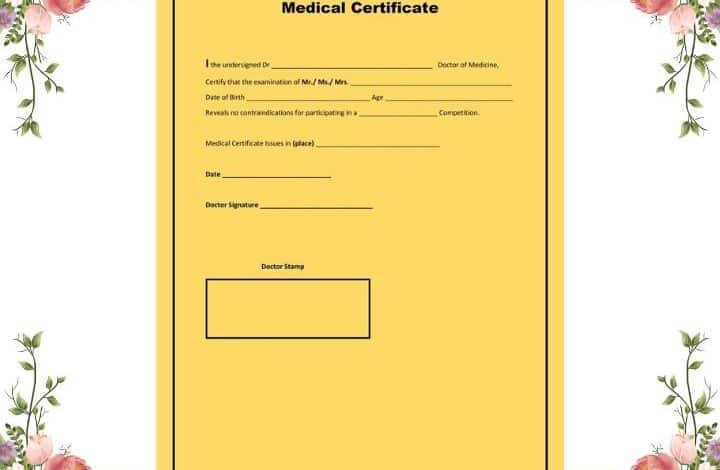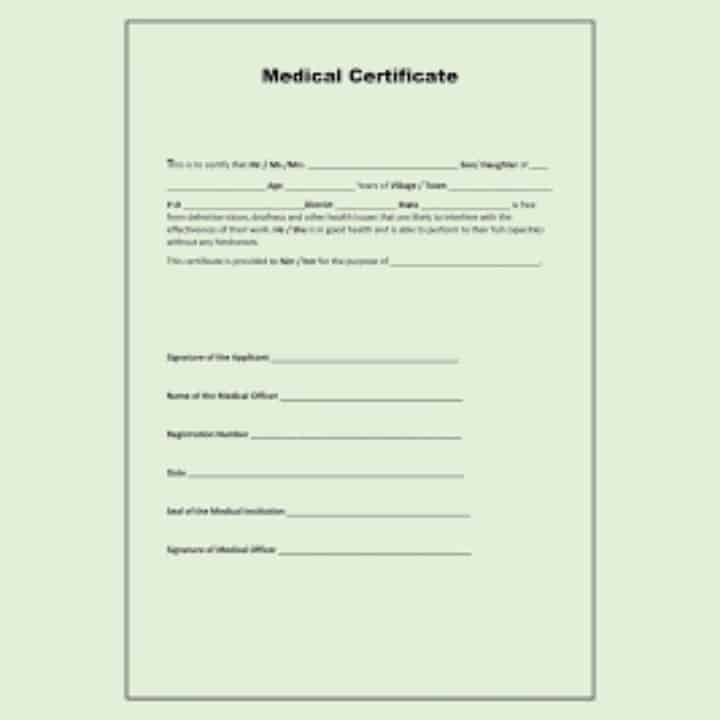Medical Fitness Certificate | A The Ultimate Guide to Understanding
Medical Fitness Certificate

When it comes to maintaining personal health and wellbeing, ensuring that you are fit to take on specific activities or responsibilities is crucial. One formal way to verify this is through a medical fitness certificate. This document serves as proof that an individual is in a condition to perform specific tasks, such as working in certain job roles, participating in fitness activities, or travelling to areas with health risks. In this article, we will explore everything you need to know about medical fitness certificates, including why you might need one, how to obtain it, and its importance in various scenarios.
What is a Medical Fitness Certificate?
A medical fitness certificate is a formal document issued by a licensed healthcare provider that verifies an individual’s physical fitness and suitability for a particular activity or responsibility. This certificate is often required by employers, government agencies, or other authorities to ensure that a person does not have any medical conditions that would compromise their health or safety while performing certain tasks.
It may also include recommendations for any specific precautions or treatments, depending on the nature of the activity or job.
Why Do You Need a Medical Fitness Certificate?
1. Employment Requirements
Many employers, especially in physically demanding fields like construction, healthcare, aviation, and transportation, require a medical fitness certificate to ensure that their employees are healthy and fit to work. This ensures not only the safety of the individual but also that of their colleagues and the general public.
2. Travel and Immigration
Certain countries or destinations may require a medical fitness certificate to ensure that a person is in good health before travelling, especially when travelling to places with higher risks of contagious diseases or health hazards. This helps authorities confirm that the applicant does not have any conditions that might pose a threat to public health.
3. Sports and Fitness Activities
Individuals engaging in high-intensity sports or fitness activities might be asked to provide a medical fitness certificate to confirm that they do not have any underlying health issues that could make physical activity dangerous.
4. Educational and Professional Requirements
In some cases, students or professionals may be required to submit a medical fitness certificate before engaging in internships, specialized courses, or educational programs.
5. Insurance and Health Coverage
This is especially relevant in high-risk insurance policies where physical fitness plays a critical role in the coverage offered.
How to Obtain a Medical Fitness Certificate?
Step 1: Consult a Healthcare Professional
To obtain a medical fitness certificate, you first need to consult a licensed healthcare provider or a medical practitioner who can evaluate your physical health. Depending on the requirements, this could be your general practitioner (GP), a specialist, or a physician who works in a specific field like sports medicine, occupational health, or aviation medicine.
Step 2: Undergo a Medical Examination
The doctor will typically conduct a thorough examination, which may include:
# A review of your medical history.
# Vital sign checks (e.g., blood pressure, heart rate).
# Blood tests or other diagnostic tests.
# Physical fitness tests, such as strength, flexibility, and endurance assessments.
# A mental health evaluation, if necessary (especially for jobs with high psychological demands).

Step 3: Receive the Certificate
Once the healthcare provider has completed the evaluation, they will determine whether you meet the necessary health standards for the intended activity:
# Your name and personal information.
# The specific activity or job for which the certificate is being issued.
# The date of the medical examination.
# Any medical conditions or restrictions (if applicable).
# A statement confirming your overall physical and mental fitness.
If the doctor determines that you are unfit for the activity, they may suggest further tests, treatments, or a period of rest before issuing the certificate.
Read more: A Comprehensive Guide
Key Factors Considered in the Medical Fitness Assessment
A medical fitness certificate evaluates various factors to determine whether an individual is physically and mentally fit for a specific activity or responsibility. Healthcare providers carefully consider the following aspects during the assessment:
1. Physical Health
The overall physical condition of the individual is a primary focus. The healthcare provider checks for any existing medical conditions, injuries, or physical impairments that could affect the person’s ability to perform certain tasks. Some key components include:
# Vital signs: Blood pressure, heart rate, body temperature, and respiratory rate.
# Cardiovascular health: Heart function, risk of heart disease, and the ability to handle physical exertion.
# Musculoskeletal health: Joint function, muscle strength, flexibility, and any history of injuries like fractures or strains.
# Weight and body mass index (BMI): To evaluate whether a person is within a healthy weight range.
2. Mental Health
Mental fitness is just as important as physical health in many situations. For jobs involving high stress, precision, or safety-critical tasks, a healthcare provider may assess cognitive function and psychological health, looking for:
# Cognitive function: The ability to focus, make decisions, and handle pressure.
# Mental health disorders: Conditions such as anxiety, depression, or stress that may affect performance, particularly in high-pressure environments.
# Stress management: A person’s ability to cope with stress, especially in high-risk or physically demanding jobs.
3. Specific Medical Conditions
Certain conditions may disqualify a person from obtaining a medical fitness certificate for specific activities. For example:
# Chronic illnesses: Conditions like diabetes, hypertension, or asthma that may require careful management in certain environments.
# Neurological conditions: History of seizures, fainting, or neurological disorders that may impact motor skills or reaction time.
# Endocrine disorders: Conditions like thyroid issues that can impact metabolism or energy levels.
4. Age and Physical Capability
The healthcare provider will consider the individual’s age and overall physical capability. For example:
# Older adults: As we age, our bodies may require more time for recovery or have a reduced capacity for certain physical tasks. A tailored fitness assessment may be necessary to evaluate how well someone can handle physical exertion.
# Lifestyle factors: Sedentary lifestyles may require additional focus on fitness improvement, whereas highly active individuals may need only a basic check-up.
How Long is a Medical Fitness Certificate Valid?
The validity of a medical fitness certificate depends on several factors, including the nature of the activity for which it was issued, the individual’s health condition, and the policies set by the organization or governing body requesting the certificate. While there is no universal time frame for all situations, here are some general guideline.
Conclusion
A medical fitness certificate is an essential document that can help ensure you are physically and mentally fit for specific activities, whether it’s securing a job, travelling, or engaging in sports. By obtaining a medical fitness certificates, you are not only demonstrating your personal commitment to health and safety but also meeting the requirements set forth by employers, governments, and organizations.




